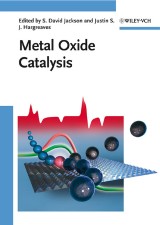Details

Metal Oxide Catalysis
1. Aufl.
|
345,99 € |
|
| Verlag: | Wiley-VCH |
| Format: | |
| Veröffentl.: | 23.12.2008 |
| ISBN/EAN: | 9783527626120 |
| Sprache: | englisch |
| Anzahl Seiten: | 887 |
DRM-geschütztes eBook, Sie benötigen z.B. Adobe Digital Editions und eine Adobe ID zum Lesen.
Beschreibungen
With its two-volume structure, this handbook and ready reference allows for comprehensive coverage of both characterization and applications, while uniform editing throughout ensures that the structure remains consistent. <br> The result is an up-to-date review of metal oxides in catalysis. The first volume covers a range of techniques that are used to characterize oxides, with each chapter written by an expert in the field. Volume 2 goes on to cover the use of metal oxides in catalytic reactions.<br> For all chemists and engineers working in the field of heterogeneous catalysis.<br>
VOLUME 1: CHARACTERISATION OF METAL OXIDES<br> EPR Spectroscopy<br> UV-Visible Spectroscopy<br> FTIR Spectroscopy<br> Raman Spectroscopy<br> NMR Spectroscopy<br> XPS<br> EXAFS<br> Theory<br> Thermal Analysis<br> Electron Microscopy<br> <br> VOLUME 2: CATALYSIS OVER METAL OXIDES<br> Monolayer Oxide Catalysts<br> Vanadium Phosphate Catalysts<br> Uranium Oxide Catalysts<br> Polyoxometallate/HPA Catalysts<br> Oxidative Dehydrogenation Catalysis<br> Highly Dispersed Metal Oxide Catalysts<br> Superacidic Metal Oxides<br> TS1<br> Oxide Materials in Photocatalytic Processes<br> Catalytic Ammoxidation of Hydrocarbons with Mixed Metal <br> Oxides<br> Oxide Base Catalysts<br>
"The editors are to be congratulated on putting together two comprehensive volumes of material on metal oxide catalysis that will remain useful as master-degree and more general reference texts for several years." (<i>Angewandte Chemie</i>, May 2009)
Justin Hargreaves obtained his PhD from the University of Liverpool in 1990, holding subsequent postdoctoral positions at ETH Zurich and at the University of Liverpool. From 1994-2000, he was a Senior Research Fellow at Nottingham Trent University, and from 2001-2002 a Principal Scientist at the Leverhulme Centre for Innovative Catalysis. In 2002, he took up his current position as Lecturer at the Department of Chemistry, University of Glasgow. He became Senior Lecturer in 2006. His research interests centre upon the elucidation of structure-activity relationships in heterogeneous catalysis, particularly for oxidation and alkane activation reactions, and have resulted in the publication of ca 55 papers to date. He has served as Honorary Secretary of the Royal Society of Chemistry's Surface Reactivity and Catalysis subject group (1998-2002) and was a member of the Faraday Council (2000-2003). He is currently a committee member of the Royal Society of Chemistry's Thermal Methods Group. Since 2004, he has been a member of the Council of the International Association of Catalysis Societies.<br> <br> S. David Jackson obtained his Ph.D. from the University of Glasgow in 1979. He was an ICI postdoctoral research fellow at the University of Hull for three years before joining ICI plc in 1982. For the next 18 years Professor Jackson was a senior scientist with ICI, his last role was that of Synetix RT&E Group, Strategic Technology Manager, which had a remit for the development of new science areas. He joined the University of Glasgow in 2000 as Professor of Catalysis Science. His research interests lie in the areas of metal catalysed hydrogenation, heterogeneous catalysis in fine chemicals synthesis, catalyst deactivation, dehydrogenation and adsorption. He has over 140 publications in the area of catalysis, and is author of 13 patents. He is currently a member of the Editorial Board of Current Topics in Catalysis and was a member of the Editorial Board of Applied Catalysis A, from 2004-2007. He has served as treasurer (2005-2007) and secretary (2003-2005) of the European Federation of Catalysis Societies and is currently chairman of the Royal Society of Chemistry's Surface Reactivity and Catalysis subject group.<br>
Metal oxides are easy to handle and stable catalysts. Due to the ability to use "normal" metals, they do not have any detrimental effect on the natural world and therefore are more environmentally friendly catalytic systems than their heavy and noble metal counterpart catalysts. Furthermore, by developing new and more effective catalysts there is less pollution and a more effective use of resources.<br> An up-to-date review of metal oxides in catalysis, this handbook and ready reference allows for a comprehensive coverage of both characterization and applications, while uniform editing throughout ensures that the structure remains consistent. <br> From the contents:<br>

















